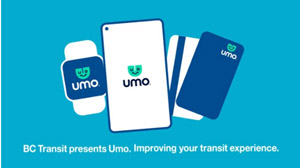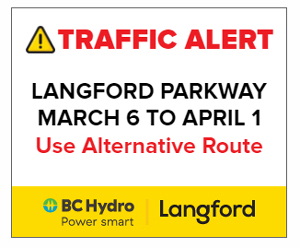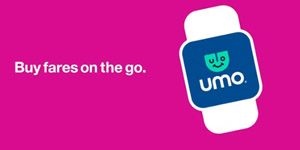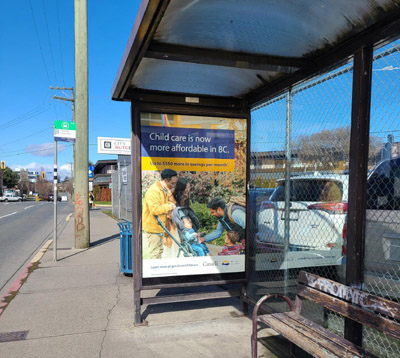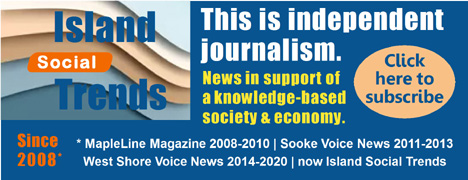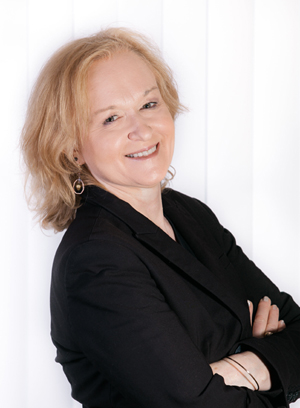Monday March 13, 2023 | VICTORIA, BC
by Mary P Brooke | Island Social Trends
The next step in BC Transit’s Electronic Fare Collection System Project is underway.
BC Transit is now piloting Umo (pronounced “you-mo”) in the Victoria Regional Transit System.
In the coming weeks, riders will see fare validators installed aboard the bus as the organization begins to test the Umo platform. The pilot project is intended to test the end-to-end components of the Umo platform prior to full implementation in the Victoria Regional Transit System later this spring.
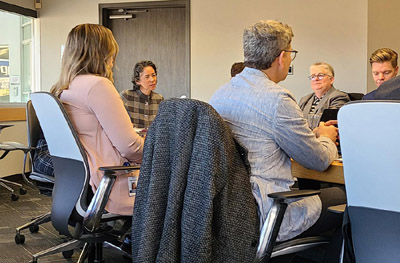
New commission profile:
Mayors and others at the Victoria Regional Transit Commission (VRTC) meeting this morning in Victoria heard about this new development, among other staff presentations.
Some of the VRTC members are new since the October 2022 municipal election.
The VRTC is chaired by Sooke Mayor Maja Tait. Other commission members are Victoria Mayor Marianne Alto, Saanich Mayor Dean Murdock, Oak Bay Mayor Kevin Murdoch, Central Saanich Mayor Ryan Windsor, Metchosin Mayor Marie-Térèse Little, Victoria Councillor Chris Coleman, and Saanich Councillor (and CRD Chair) Colin Plant, as well as student representative Jessie Niikoi (Camosun /UVic).
Two-phase project:
The pilot project will be delivered in two phases, starting first with BC Transit employees before expanding to external transit stakeholders.
The pilot project is expected to run for several weeks with continual testing and adjustments being made throughout in order to ready BC Transit to launch Umo transit system-wide once complete.
The new payment methods will be implemented in two phases, initially enabling the Umo mobile app and reloadable Umo card payments before payment by credit card, debit card, and mobile wallets will be enabled.
Contactless payment:
Umo will replace BC Transit’s end-of-life technology and equipment, and introduce contactless payment methods that will improve the transit experience.
New payment methods will provide riders with the ability to pick the best payment method for their lifestyle and travel habits, including:
- mobile app,
- reloadable card,
- debit card,
- credit card, and
- mobile wallet.
These new payment methods will increase access to transit by removing barriers such as requiring riders to continually pre-purchase tickets and passes or carry exact change.
Some fare changes:
At launch, Umo will introduce changes to some of the fares that riders use with the introduction of the 30-Day Pass and Cash Balance.
- These new offerings will provide riders with further ability to select the best option for their needs.
- The 30-Day Pass will eventually replace the existing Monthly Pass and provides the same convenience of having an unlimited long-term fare product but introduces the added flexibility of not having to wait until the start of a calendar month to utilize transit services.
- Cash Balance is stored dollar amounts loaded to a rider’s account to be drawn from as they take trips.
- Riders will be able to easily purchase both the 30-Day Pass and Cash Balance with their mobile device, through a new web portal, or at a retailer and board the bus by simply scanning their Umo app or tapping their reloadable Umo card.
DayPASS upgrade:
The popular DayPASS fare product will benefit from an upgrade when Umo is launched by increasing the payment methods that can be used to receive it.
Riders who select the Umo app or reloadable Umo card will have their fare capped and automatically converted to a DayPASS after their second tap or scan. This means regardless of a rider’s chosen Umo product, in transit systems that offer a DayPASS, a rider will never pay more than two times the value of a cash fare for unlimited daily travel. Cash will continue to be accepted for single ride and DayPASS fares.
In the Victoria Regional Transit System, the cost of a DayPASS is $5.
For more information about BC Transit’s Electronic Fare Collection System Project and the Umo Pilot Project, please visit the BC Transit UMO info page (including a video) or email BC Transit.
===== ABOUT ISLAND SOCIAL TRENDS:
Island Social Trends is a long-standing publication in the west shore of South Vancouver Island (fourth in a series that began with MapleLine Magazine 2008-2010, Sooke Voice News 2011-2013, and West Shore Voice News 2014-2020, which then emerged as Island Social Trends in mid-2020).
Island Social Trends editor is Mary P Brooke, B.Sc., Cert PR. She is a long-time journalist, delivering news through a socioeconomic lens.
IslandSocialTrends.ca covers news of the Greater Victoria area and south Vancouver Island, with insights on BC and national issues.
Ms Brooke has consistently covered progressive politics on Vancouver Island including a focus on food security for the South Vancouver Island region. She has presented detailed coverage of the SD62 School Board and its committees since 2014.
ARCHIVES: POLITICS | VANCOUVER ISLAND | SD62 SCHOOL DISTRICT | FOOD SECURITY | BUSINESS & ECONOMY | TRAVEL & TRANSPORTATION
SUBSCRIBE to ISLAND SOCIAL TRENDS: Free ENEWS | Premium Subscriber/Sponsor


